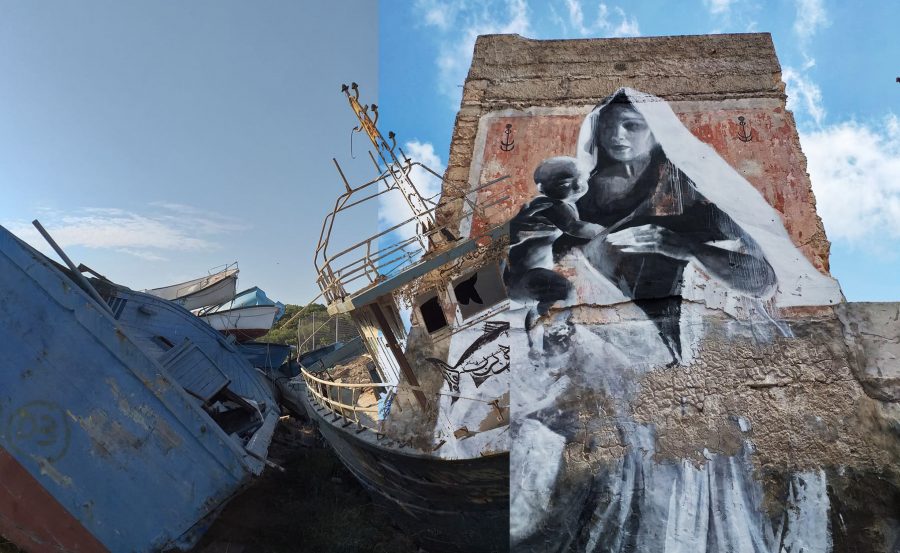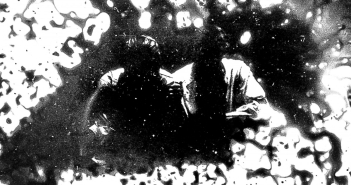In October of 2013, a ship carrying hundreds of women, men and children, mainly from Eritrea and Ethiopia, sank off the coast of Lampedusa, Italy. Over three hundred of those on board drowned, prompting a brief media focus on the precarious journeys of those seeking refuge in Europe.
One of the accounts published in the aftermath was that of a local diver, Renato Sollustri, who was part of the search and recovery response. He described swimming into the hold of the submerged boat and seeing the body of a young woman who seemed as if she was pregnant. He recounted taking her out of the boat: ‘We laid her on the sea bed. We tied her with a rope to the other bodies and then…we rose with them from the depths of the sea.’ When they surfaced and lifted her onto a waiting boat they found that she had given birth while the boat sank, the body of her new-born son, attached by his umbilical cord, underneath her clothes.
I had spent the years prior to reading the account active in migrant justice and refugee solidarity work. During those years I had heard many other stories of horrific, preventable, lonely deaths, of women, men and children: suffocating in the backs of refrigerated trucks; killed by high-speed trains; pushed back at sea or left to die by smugglers when injured along the way through mountainous or desert border crossings.
The account of Sollustri, however, impacted on an even more immediate level. I had recently had a child myself, and I knew the powerful, visceral urge to protect, to keep him safe. I dreamt about the young, as yet unidentified, woman for weeks afterwards and closely followed the accounts of survivors, many of whom, despite initial platitudes and promises of citizenship, ended up destitute and precarious, living on the streets of Italian cities, without access to the island graves of their loved ones.
Many of us involved in refugee and migrant solidarity networks thought at the time that the widespread coverage of the sinking, and subsequent shipwrecks in the weeks and months afterwards, might serve to spotlight the deadly causality of EU migration policies – of externalised, securitised borders and preventable deaths at sea, which continued and intensified in the years following. Some of those deaths catalysed public grief and empathy, such as the images of young Alan Kurdî, and many others became almost normalised in a context in which the death toll was ongoing and relentless.
I knew that I should be there, in whatever capacity was useful – to witness, accompany and respond, to platform and archive journeys that were defined by such profound and often overwhelming displacement, external and internal.
I had worked in refugee camp contexts and with displaced communities for most of my adult life – in Chiapas, Guatemala, Haiti, Palestine, Iraq, Lebanon and Syria. The topographies of those journeys were different, but the inner processes, of trauma and resilience, vulnerability and strength, identity reformation in exile, the humiliations of enforced dependency, mirrored and echoed each other, beyond borders.
I had trained in Gaza as an EMT to volunteer with ambulance services during airstrikes and intensified violence and I had learned Arabic. It was this – a shared language and the emotional and psychological access and intimacy it engenders – that was to become the most practical form of solidarity I could offer over the years that followed.
I mobilised a support system around my young child in Dublin – family and friends – and started travelling to, and volunteering with, sea and shore response teams, with mobile medics and later psycho-social projects in Lesvos, Lampedusa, refugee camps in the North of Greece and the Balkans, and in Calais.
The trips were short when Tadhg was young, a week or two at a time, longer as he got older. When the situation and context of the work allowed for it, I took him with me, and his presence, his little legs and hand in mine slowed my own pace down.
And in that stillness came a prioritisation of long conversations, of deepening connections with other mothers and their children, sharing memories and vulnerabilities, grief and courage and hopes in their tents as they struggled to adjust to lives lived in limbo.
It was that shared space that prompted me to then train as a psychotherapist, to be able to respond to the physiological and cognitive registers of trauma, sometimes subtle, sometimes overt, that I was witnessing in so many contexts, feeling in so many conversations.
At times the work was devastating, working with survivors of brutally violent torture, with women like Nadia, a Yazidi survivor of ISIS captivity who had been gang-raped repeatedly in the presence of her children; who survived the executions of twenty-three members of her family, many of those in front of her. And at times there was joy, beautiful, poignant moments of the overwhelming joy of survival; of families and lone voyagers who had survived the wars and sea crossings and, despite the hardships to come, created acts and moments of beauty and creative resistance; of music, community and self-organisation.
My phone, and WhatsApp messages, became a constant portal into so many stories: of refuge-seekers enduring geographical journeys not yet completed; of those navigating the re-building of lives, recovering themselves in places of safety. Glimpses, too, of the often deeply isolating experience of forced migration – the seeping expressions of loneliness when the external journey has ended and the internal one begins.
It remains so, my phone is a conduit to a multiplicity of stories in a multiplicity of languages. And my own life, too, within it all, has come to reflect aspects of a different sort of displacement, though one in which choice, privilege and power is recognised and held, always, with critical self-reflexivity and accountability.
That life, or lives, are lived between Dublin and camps in Greece, Lebanon and elsewhere, juggling jobs and parenthood here and the necessity of constant response, long-distance, to an escalating humanitarian crisis and the violent erosion of the most basic rights of refuge-seekers there.
It has within it forms of unofficial social work – one that so many volunteers and solidarity activists have by necessity become adept at over the past years – but forms of social care that are carried by individuals or disparate networks, in which there is no system to hold the work, no safety net for the many who fall through it. And in the scale and immediacy of trying to resource so many families and unaccompanied minors, raise funds, organise legal supports, secure emergency housing, lobby and advocate for changes to policies that comprehensively deny rights and justice, we always fall short in our attempts to support those who have become friends and, often, spiritually, family.
That failure weighs heavily, along with the presence within the absence, of holding the urgency of the memories of the tens of thousands of named and unnamed women, men and children who have died making the journey, their lives and deaths tugging at the borders of consciousness and spirit. But hope is held alongside the grief – one that honours the survival, and strength and potentiality of those who have lived – who continue to endure and to tentatively hold space for a life of arrival, and welcome.
And within that we honour our own survival, and strength and potentiality, as individuals and communities who witness these times of injustice, but who work to create spaces of refuge and love within them.




